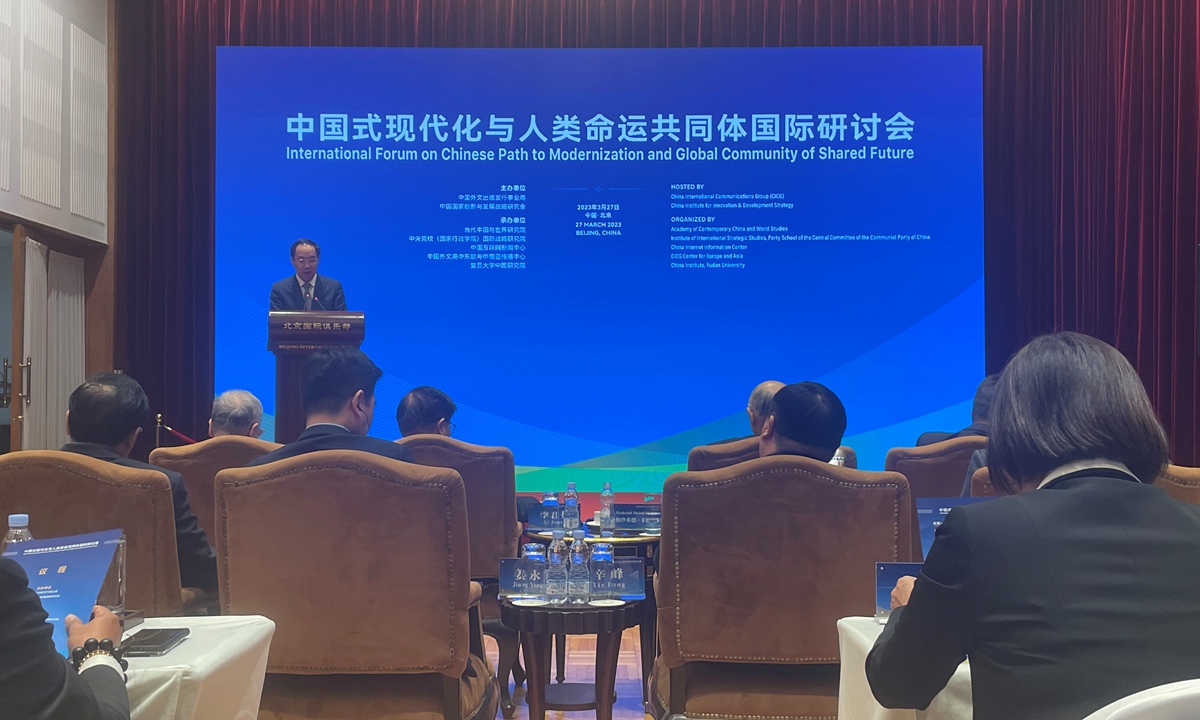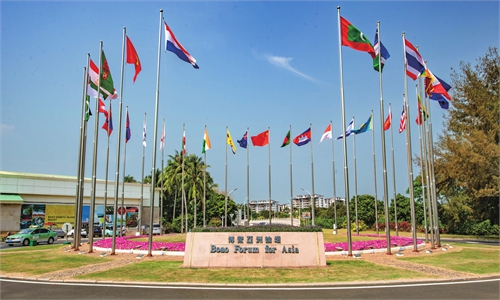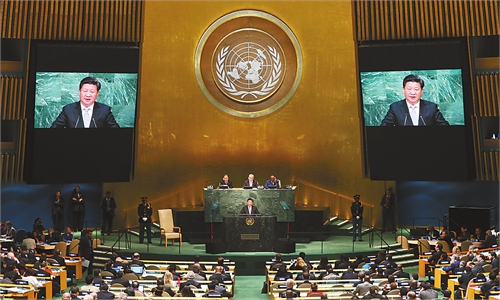International forum focuses on Chinese modernization, as foreign scholars expect a global community of shared future

The International Forum on Chinese Path to Modernization and Global Community of Shared Future is held in Beijing on March 27, 2023. Photo: Lin Xiaoyi/GT
On the occasion of the 10th anniversary of the concept of building a global community of shared future, an international forum focusing on the Chinese path to modernization and the ideal of a global community of a shared future sparked a lively discussion among nearly 100 politicians, scholars and experts in various fields from 14 countries at an international forum held in Beijing on Monday.
The participants who were attending the International Forum on Chinese Path to Modernization and Global Community of Shared Future reached a consensus that Chinese modernization not only is a way to promote high-quality development in China, but also provides new opportunities and ideas for the realization of joint development globally.
The event was jointly held by the China International Communications Group and China Institute for Innovation and Development Strategy with dignitaries, representatives of international organizations, as well as experts and scholars from think tanks, universities, and research institutes from China, the UK, France, Russia, Japan, and Pakistan, present in person and via video link.
Analysts pointed out that the forum discussed several important topics at an important moment in history.
The world has entered a new period of turbulence and change. Standing at an important crossroads - including whether to choose peace or a possible new cold war or even a "hot war" driven by power and fire - and whether to choose sustainable development, or promote unilateralism and protectionism, depends on the choice of all peoples, Li Junru, former vice president of the Party School of the Central Committee of the Communist Party of China (CPC), said in his address to the forum.
"Promoting building a global community with a shared future with Chinese modernization is the solution that China offers to the world," Li said.
During the conference, international observers praised China's development in recent decades, through which the country has found its own path to modernization in stark contrast with the Western way.
Mushahid Hussain Sayed, chairman of Pakistan's Senate Defense Committee, said that as to common global development, China's emphasis on people-centered development philosophy and the path of win-win cooperation has not only provided many developing countries with new solutions and valuable experience in achieving their own modernization, but has also made positive contributions to the upholding of fairness and justice and opposition to power politics.
"In this changing world order, China is presenting a choice of connectivity and cooperation as opposed to conflict and confrontation, while some people in the West are talking about containment and a Cold War," Sayed told the Global Times.
Western modernization can also be called the modernization of capitalism, said Wirun Phichaiwongphakdee, director of the Thailand-China Research Center of the Belt and Road Initiative.
"Although the West has tried to sugarcoat its moderation with democracy, freedom, human rights and environmental protection, Western modernization is essentially self-serving with capital as the cornerstone and emphasizes high economic growth," he continued.
On the other hand, Chinese modernization has never been based on plundering resources and waging wars. Instead, China has always adhered to the goal of peaceful development, which is fundamentally different from the modernization of Western countries, the Thai scholar noted.
According to Wirun, the China-Thailand railway will be a vivid example of how Chinese modernization and the concept of a global community of shared future benefits ASEAN members. It will not only facilitate China-ASEAN trade, but also significantly increase the sense of happiness of people in countries along the railroad.
Julian Rebon, secretary of Advanced Studies at the School of Social Sciences, University of Buenos Aires, said at the forum that China has lifted nearly 800 million people out of poverty in the past 40 years, while Argentina has undergone many transformations, the drawbacks of neoliberalism have gradually emerged.
He said he hopes to carry out comparative studies between Argentina and China, learn to promote the implementation of policies from China to eliminate poverty and reduce inequality, and contribute to the common development of our societies.
The most important aspect of Chinese modernization is that it echoes the vision of building a global community of human destiny, said Mohammed Saqib, secretary-general of the India China Economic and Cultural Council.
In Saqib's words, this vision is based on cooperation among countries to address challenges and achieve sustainable development, reflecting China's desire to play a more constructive role in the global governance system.
Saqib told the Global Times that India has been looking at and following China's development path very closely. Due to different political systems, it is difficult to replicate everything from China. However, there is a lot to learn from China for India and other developing countries, he believes.
"For example, the Chinese model can provide these countries with experience regarding not only modernization, but also governance," Saqib explained.


